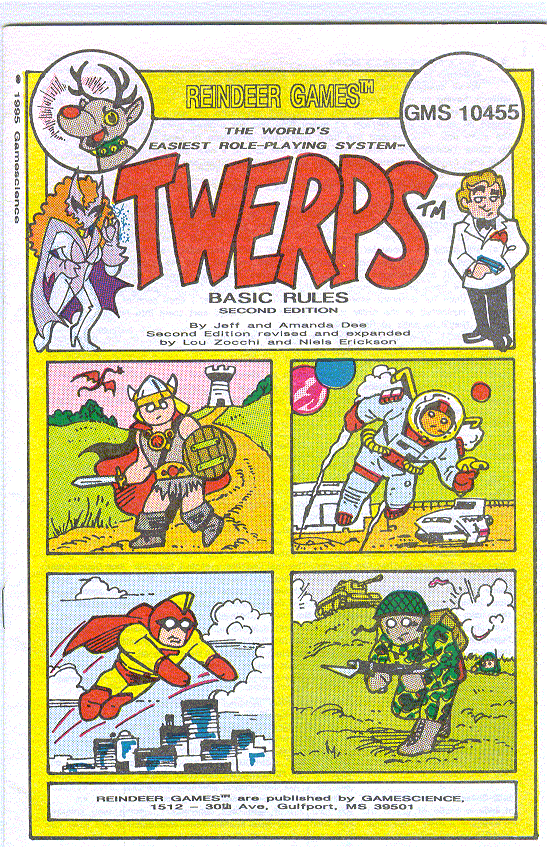

The EV-WEB
- - Eclectic
Verity
- - -
Eccentric
Variety - -
- - Esoteric
Validity - -


 Originally intended as pure parody, TWERPS has turned out to be a liberating
gaming system; in its simplicity, it forces players and game master to turn to
each other and to their shared storyline, a pleasant change from the usual focus on
memorized rules errata and player-game master duels over petty technicalities.
Originally intended as pure parody, TWERPS has turned out to be a liberating
gaming system; in its simplicity, it forces players and game master to turn to
each other and to their shared storyline, a pleasant change from the usual focus on
memorized rules errata and player-game master duels over petty technicalities.
What is it that makes TWERPS,
The-World's-Easiest-Role-Playing-System, one of the best game systems
for role-play on the market today? There are two compelling reasons.
First, TWERPS has built into it something no other role-playing system truly
offers : an inevitably storytelling-dependent game system, a system in which
player - game master interaction must take precedence over any focus on rulebook
specs & regs, since TWERPS rules have a conscious simplicity. Second, TWERPS has a
clever sense of playfulness and wit, which is a nice change of pace from the
overused faux angst which has become the hackneyed cliché of gaming in the
1990s. The individual campaign books often make a person laugh out loud
(or groan out loud, depending on a person's tolerance for rapid-fire puns),
and the entire set of TWERPS books costs about $40 total, which is often barely
enough to buy just one book in most other game systems.
TWERPS skills are role-play not rules-play skills.
The skills are only lightly defined. For example, there is no
pickpocketing skill, no find/disarm traps skill, no sleight-of-hand
skill; there is simply the profession/skill entitled Thief, which
grants the character abilities defined only as '+2 to rolls involving thief-related
tasks' ! If the player wants the character to use her or his Thief
abilities to find a hidden door, she or he does not turn to a rulebook to
determine whether or not the character can find hidden doors; in TWERPS,
the player negotiates with the game-master (often aided by fellow players) over whether
or not the ability to find hidden doors would be a reasonable part of the character's
abilities, based on the character's past, character conception,
and player persuasiveness. In other words, the intuitive logic
of the story resolves such questions, NOT rulebook citations!
The players and the game master interact with each other instead of interacting with
a lifeless rulebook, which prompts players and game masters to work together
in the storytelling rather than in opposition to each other as such nefarious game masters
as Killer G.M.s are wont to do.
TWERPS uses only one attribute:
ST. In TWERPS, there is
no need to search any rulebooks to discover which attribute pertains to any
game situation; it's always ST.
And just as it is obvious that nobody has identical levels of physical
strength, agility, reasoning, and so forth, it is
also obvious that ST can not stand for any of
these physical or mental or spiritual or social traits. No one trait affects
all our efforts in ordinary real life, so ST can
not be a real-life trait. However, no role-playing game reflects
ordinary life; role-playing games reflect the worlds of stories and myths,
and in such tales, the one trait which affects all of a character's efforts is
her or his narrative importance to the storyline. Heroes and major villains
have greater overall success or luck than secondary characters even when the heroes are
inept and the secondary are highly skilled at their tasks; heroes and major villains
have greater ST than secondary characters (who may have
higher specific skill bonuses, of course). TWERPS has only one
attribute, and that attribute is intrinsically linked to storytelling.
The clever simplicity of the rules system in TWERPS requires a
different mindset than many players are used to. Damage is preset and fairly
low (a fist does 1 point of damage, a two-handed sword does 3 points) but is subtracted
directly from a character's current ST (which officially stands for
STrength but which I consider to stand for
STature to avoid the connotations most gamers
associate with the term Strength). Since a character's
ST averages at '5' and tops out at
'12', and since a character's current ST is
the basis for all rolls for success (whether attack rolls or skill rolls or perception
rolls or rolls against fear), even 1 point of damage is threatening to a character.
Therefore, the goal in TWERPS is not to build a character who is the last one standing
after a slow slugfest but rather a character who manages to avoid combat in the first place!
All rolls in TWERPS are made by adding the character's current
ST to the roll of one ten-sided die (1d10) and
comparing this result against a difficulty level ranging from 1 (absurdly easy) to 10
(incredibly difficult!). Professions/skills often provide bonuses which
may be added to this roll as well. If the result of the dice roll +
ST + any modifiers is greater than the difficulty,
the effort succeeded--and that's it, for any kind of roll!
In its Zen-like simplicity, TWERPS can encompass a wide variety of
styles from deadly serious to painfully punful. There are TWERPS campaign
booklets set in fantasy, horror, Kung Fu, mecha, cyberpunk,
superhero, and various kinds of SF, as well as several clever parodies of
television programs. All TWERPS campaign booklets are compatible with each other,
and the system's simplicity makes multiple-genre games exceedingly easy to run for any
game-master comfortable with campaigns that require a lot of role-play and player - game master
negotiation. The one gaming genre TWERPS handles poorly is hack-'n'-slash
: a good hack-'n'-slash requires far more complexity of combat maneuvers and
far less role-play than TWERPS.
Click here to read the
only internet review of TWERPS I have ever found. Click
here to read a Japanese
perspective on TWERPS by Kiyofumi Hashizaki.
Translations from other systems into TWERPS :
It's almost impossible to translate directly any character from
another game system into TWERPS. However, a translation in spirit rather than
a literal translation is fairly easy after perusing the various booklets a few times.
Remember that Character Level (from any game which uses levels) will not translate directly into
ST in TWERPS. For example, Character Level in
Advanced Dungeons & Dragons represents character experience (by way of Experience Points),
but in TWERPS, ST is bought up with Experience Points just
as professions/skills are, so a highly experienced character may still have a low
ST if the player has spent most of the Experience Points on improving
professions/skills instead. Other games, such as the various White Wolf products,
do not use levels. In such cases, remember that ST
is not equivalent to any attribute or characteristic. In some White Wolf campaigns,
ST could be derived from 1 + the mean average of the sum
of all the attributes, but this might not hold for all campaigns. TWERPS
translations are worthwhile, but they involve a lot of judgment calls.
Click  to return to The Ev-Web index.
to return to The Ev-Web index.
 for comments, considerations,
for comments, considerations,
commendations and confusions,
or to just  me.
me.
visitors have spun their way to my web.
